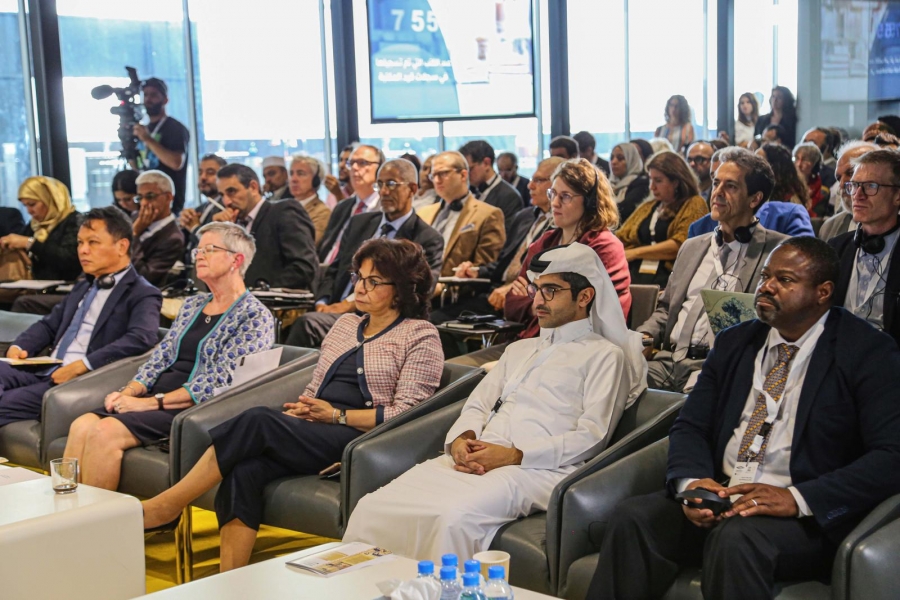الأنباط -
الأنباط
Doha, Qatar, 21 December 2019: Representatives from libraries and cultural institutions from across the Middle East and North Africa joined international experts to discuss key issues relating to heritage preservation in the region at a high-level conference, which was jointly organized by Qatar National Library and the United Nations Educational, Scientific and Cultural Organization (UNESCO) on 1 and 2 December.
The two-day conference was hosted by the Library in its role as the International Federation of Library Associations and Institutions’ (IFLA) Regional Preservation and Conservation Center for Arab Countries and the Middle East and was part of a joint Qatar National Library-UNESCO project, "Supporting Documentary Heritage Preservation in the Arab Region.”
One of the highlights of the conference was the agreement of the participants to a "Declaration to Support Preservation of Documentary Heritage in the Arab region,” calling for action on all levels to raise the standards of conservation and care of documentary heritage based on regional and global best practices.
Delegates from institutions in Qatar, Algeria, Iran, Iraq, Jordan, Kuwait, Lebanon, Libya, Mauritania, Morocco, Oman, Palestine, Sudan, Tunisia and Yemen agreed to seize the opportunities presented by digital technologies to support access, use and preservation of the region’s rich heritage. The Declaration also highlighted the need to advance an international legal instrument on preservation and access at the World Intellectual Property Organization, setting minimum standards in a digital age and enabling cross-border collaboration and exchange.
The conference presented best practices in preservation and conservation, and highlighted initiatives and strategies implemented at the national and regional levels to preserve and promote documentary heritage throughout the region. UNESCO representative Danilo Padilla, on behalf of Anna Paolini, UNESCO Director of the office for the Gulf States and Yemen, said: "In a region marked by protracted conflicts, we need to step up efforts to ensure that our common heritage and our common memory are not erased.”
Speaking at the conference, Christine Mackenzie, President of IFLA, said: "Culture is a basic need and a community thrives through its cultural heritage; it dies without it. This conference has been so important, and we heard so many stories of really terrible things that are happening to documentary heritage. It is extremely important for us to hold such events to help preserve our cultural heritage.”
Dr. Nada Itani, expert on documentary heritage, presented the report and analysis of the UNESCO-Qatar National Library survey on documentary heritage in the Arab region. The report highlighted areas of concern to build an understanding of the current state of documentary heritage in the Arab region. Disaster and emergency-preparedness plans and capacity-building were highlighted as major concerns, as well as digitization and storage.
Dr. Sohair Wastawy, Executive Director of Qatar National Library, said: "Preservation has developed into a critically important part of managing a library’s most precious assets—its collection. Documentary heritage in our region is at risk for a variety of reasons, ranging from war and natural disasters to climate conditions and the age and quality of the heritage items. It is our job as memory institutions to protect our shared human heritage for future generations.”
Discussions also focused on the importance of strengthening coordination and sharing capacity and best practices from centers of expertise.
Hazem Jamjoum, Gulf Audio Curator and Cataloguer at the British Library-Qatar Foundation Partnership Project, said: "A country’s ability to preserve its heritage and make it accessible to present and future generations is indeed part of the UN Sustainable Development Goals. Documentary heritage preservation is part of a broader set of cultural processes that are crucial in working toward achieving these goals. Together, we can improve access to information and help break down barriers that restrict knowledge sharing and preservation. The Qatar Digital Library is a good example, which exemplifies an open access world. Anyone with an Internet connection can easily access the information on the portal.”
-ENDS-

